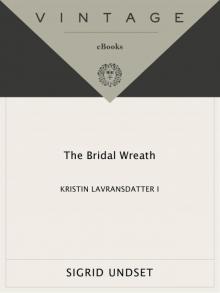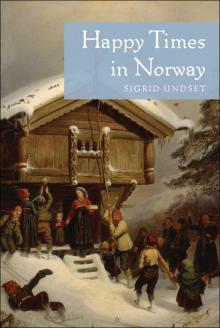- Home
- Sigrid Undset
Kristin Lavransdatter Page 74
Kristin Lavransdatter Read online
Page 74
For a long time Kristin sat in utter silence.
“I understand. These are more serious matters than what came between Sir Erling or the Haftorssøns and the king.”
“Yes,” said Gunnulf in a subdued voice. “Haftor Olavssøn and Erlend were supposedly sailing to Bjørgvin. But they were actually heading for Kalundborg, and they were to bring Prince Haakon back with them to Norway while King Magnus was abroad courting his bride.”
After a moment the monk continued in the same tone of voice. “It must be . . . nearly a hundred years since any Norwegian has dared attempt such a thing: to overthrow the man who was king by right of succession and replace him with an opposing king.”
Kristin sat and stared straight ahead; Gunnulf could not see her face.
“Yes. The last men who dared undertake this game were your ancestors and Erlend’s. Back then my deceased kinsmen of the Gjesling lineage were also on the side of King Skule,” she said pensively.
She met Gunnulf’s searching glance and then exclaimed hotly and fiercely, “I’m merely a simple woman, Gunnulf—I paid little attention when my husband spoke with other men about such matters. I was unwilling to listen when he wanted to discuss them with me. God help me, I don’t have the wits to understand such weighty topics. But foolish woman that I am, with knowledge of nothing more than my household duties and rearing children—even I know that justice had much too long a road to travel before any grievance could find its way to the king and then back again to the villages. I too have seen that the peasants of this country are faring worse and must endure more hardships now than when I was a child, and blessed King Haakon was our lord. My husband . . .” She took several quick, shuddery breaths. “My husband took up a cause that was so great that none of the other chieftains in all the land dared raise it. I see that now.”
“That he did.” The monk clasped his hands tightly together. His voice was hardly more than a whisper. “Such a great cause that many will think it very grave that he brought about its downfall himself . . . and in this way . . .”
Kristin cried out and leaped to her feet. She moved with such force that the pain in her breast and arms brought the sweat pouring from her body. Agitated and dizzy with fever, she turned to Gunnulf and shouted loudly, “Erlend is not to blame . . . it just happened . . . it was his misfortune . . .”
She threw herself to her knees and pressed her hands on the bench; she lifted her blazing, desperate face to the monk.
“You and I, Gunnulf . . . you, his brother, and I, his wife for thirteen years, we shouldn’t blame Erlend now that he’s a poor prisoner, with his life perhaps in danger.”
Gunnulf’s face quivered. He looked down at the kneeling woman. “May God reward you, Kristin, for accepting things in this manner.” Again he wrung his emaciated hands. “God . . . may God grant Erlend life and such circumstances that he might repay your loyalty. May God turn this evil away from you and your children, Kristin.”
“Don’t talk like that!” She straightened her back as she knelt, and looked up into the monk’s eyes. “No good has come of it, Gunnulf, whenever you have taken on Erlend’s affairs or mine. No one has judged him more harshly than you—his brother and God’s servant.”
“Never have I judged Erlend more harshly than . . . than was necessary.” His pale face had grown even paler. “I’ve never loved anyone on earth more than my brother. That is no doubt why . . . They stung me as if they were my own sins, sins that I had to repent myself, when Erlend dealt with you so badly. And then there is Husaby. Erlend alone must carry on the lineage which is also mine. And I have put most of my inheritance into his hands. Your sons are the men who are closest to me by blood. . . .”
“Erlend has not dealt with me badly! I was no better than him! Why are you talking to me this way, Gunnulf? You were never my confessor. Sira Eiliv never blamed my husband—he admonished me for my sins whenever I complained of my difficulties to him. He was a better priest than you are; he’s the one God has placed over me, he’s the one I must listen to, and he has never said that I suffered unjustly. I will listen to him!”
Gunnulf stood up when she did. Pale and distressed, he murmured, “What you say is true. You must listen to Sira Eiliv.”
He turned to go, but she gripped his hand tightly. No, don’t leave me like this! I remember, Gunnulf . . . I remember when I visited you here on this estate, back when it belonged to you. And you were kind to me. I remember the first time I met you—I was in great need and anguish. I remember you spoke to me in Erlend’s defense; you couldn’t know . . . You prayed and prayed for my life and my child’s. I know that you meant us well, and that you loved Erlend. . . .
“Oh, don’t speak harshly of Erlend, Gunnulf! Who among us is pure before God? My father grew fond of him, and our children love their father. Remember that he found me weak and easy to sway, but he led me to a good and honorable place. Oh, yes, Husaby is beautiful. On the night before I left, it was so lovely; the sunset was magnificent that evening. We’ve spent many a good day there, Erlend and I. No matter how things go, no matter what happens, he is still my husband—my husband, whom I love.”
Gunnulf leaned both hands on his staff, which he always carried now whenever he left the monastery.
“Kristin . . . Do not put your faith in the red of the sunset and in the . . . love that you remember, now that you fear for his life.
“I remember, when I was young—only a subdeacon. Gudbjørg, whom Alf of Uvaasen later married, was serving at Siheim then. She was accused of stealing a gold ring. It turned out that she was innocent, but the shame and the fear shook her soul so fiercely that the Fiend seized power over her. She went down to the lake and was about to sink into the water. She has often told us of this afterwards: that the world seemed to her such a lovely red and gold, and the water glistened and felt wondrously warm. But as she stood out there in the lake, she spoke the name of Jesus and made the sign of the cross—and then the whole world grew gray and cold, and she saw where she was headed.”
“Then I won’t say his name.” Kristin spoke quietly; her bearing was rigid and erect. “If I thought that, then I would be tempted to betray my lord when he is in need. But I don’t think it would be the name of Christ but rather the name of the Devil that would bring this about. . . .”
“That’s not what I meant. I meant . . . May God give you strength, Kristin, that you may have the will to do this, to bear your husband’s faults with a loving spirit.”
“You can see that’s what I’m doing,” she said in the same voice as before.
Gunnulf turned away from her, pale and trembling. He drew his hand over his face.
“I must go home now. It’s easier . . . at home it’s easier for me to collect myself—to do what I can for Erlend and for you. God . . . May God and all the saints protect my brother’s life and freedom. Oh, Kristin . . . You mustn’t ever think that I don’t love my brother.”
But after he had left, Kristin thought everything seemed much worse. She didn’t want the servants in the room with her; she paced back and forth, wringing her hands and moaning softly. It was already late in the evening when people came riding into the courtyard. A moment later, as the door was thrown open, a tall, stout man wearing a traveling cloak appeared in the twilight; he walked toward her with his spurs ringing and his sword trailing behind. When she recognized Simon Andressøn, Kristin broke into loud sobbing and ran toward him with outstretched arms, but she shrieked in pain when he embraced her.
Simon let her go. She was standing with her hands on his shoulders and her forehead leaning against his chest, weeping inconsolably. He put his hands lightly on her hips.
“In God’s name, Kristin!” There was a sense of deliverance in the very sound of his dry, warm voice and in the vital male smell about him: of sweat, road dust, horses, and leather harnesswork. “In God’s name, it’s much too soon to lose all hope and courage. Surely there must be a way . . .”
After a while she regained her composu
re enough to ask his forgiveness. She was feeling quite wretched because she had been forced to take the youngest child from her breast so suddenly.
Simon heard how she had been faring the last three days. He shouted for her maid and asked angrily whether there wasn’t a single woman on the estate who had enough wits to see what was wrong with the mistress. But the maid was an inexperienced young girl, and Erlend’s foreman of his Nidaros manor was a widower with two unmarried daughters. Simon sent a man to town to find a woman skilled in healing, but he begged Kristin to lie down and rest. When she felt a little better he would come in and talk to her.
While they waited for the woman to arrive, Simon and his man were given food in the hall. As they ate, he talked to Kristin, who was undressing in the alcove. Yes, he had ridden north as soon as he heard what had happened at Sundbu. He had come here, while Ramborg went to stay with the wives of Ivar and Borgar. They had taken Ivar to Mjøs Castle, but they allowed Haavard to remain free, although he had to promise to stay in the village. It was said that Borgar and Guttorm had been fortunate enough to flee; Jon of Laugarbru had ridden out to Raumsdal to hear the news and would send word to Nidaros. Simon had reached Husaby around midday, but he hadn’t stayed long. The boys were fine, but Naakkve and Bjørgulf had begged him earnestly to bring them along.
Kristin had regained her calm and courage when Simon, late that evening, came to sit at her bedside. She lay there with the feeling of pleasant exhaustion which follows great suffering, and looked at her brother-in-law’s heavy, sunburned face and his small, piercing eyes. It was a great comfort to her that he had come. Simon grew quite somber when he heard more details of the matter, and yet his words were full of hope.
Kristin lay in bed, staring at the elkskin belt around his portly middle. The large, flat buckle made of copper and chased with silver, its only decoration a filigreed “A” and “M” which stood for Ave Maria; the long dagger with the gilded silver mountings and the large rock crystals on the hilt; the pitiful little table knife with its cracked horn hilt which had been repaired with a band of brass—all these things had been part of her father’s everyday attire ever since she was a child. She remembered when Simon received them; it was right before her father died, and he wanted to give Simon his best gilded belt with enough silver to have extra plates made so that his son-in-law could wear it. But Simon asked for the other belt instead, and when Lavrans said that now he was cheating himself, Simon replied that the dagger was a costly item. “Yes, and then there’s the knife,” said Ragnfrid with a little smile, and both men laughed and said: “Yes indeed, the knife.” Her father and mother had had so many quarrels over that knife. Ragnfrid had complained every day at having to look at that ugly little knife on her husband’s belt. But Lavrans swore that she would never succeed in parting him from it. “I’ve never drawn this knife against you, Ragnfrid—and it’s the best one in all of Norway for cutting butter, as long as it’s warm.”
Kristin now asked to see the knife, and she lay in bed, holding it in her hands for a moment.
“I wish that I might own this knife,” she pleaded softly.
“Yes, I can well believe that. I’m glad it’s mine; I wouldn’t sell it for even twenty marks of silver.” With a laugh Simon grabbed her wrist and took back the knife. His small, plump hands always felt so good—warm and dry.
A short time later he bade her good night, picked up the candle, and went into the main room. She heard him kneel down before the cross, then stand up and drop his boots onto the floor. A few minutes later he climbed heavily into the bed against the north wall. Then Kristin sank into a deep, sweet sleep.
She didn’t wake up until quite late the next morning. Simon An-dressøn had left hours earlier, and he had asked the servants to tell her to stay calm and remain at the estate.
He didn’t return until almost time for mid-afternoon prayers; he said at once, “I bring you greetings from Erlend, Kristin. I was allowed to speak to him.”
He saw how young her face became, soft and full of anguished tenderness. Then he held her hand in his as he talked. He and Erlend hadn’t been able to say much to each other, because the man who had escorted Simon up to the prisoner never left the room. Judge Olav had won Simon permission for this meeting, because of the kinship that had existed between them while Halfrid was alive. Erlend sent loving greetings to Kristin and the children; he had asked about all of them, but most about Gaute. Simon thought that in a few days Kristin would surely be allowed to see her husband. Erlend had seemed calm and in good spirits.
“If I had gone with you today, they would have let me see him too,” she said quietly.
But Simon thought he had been granted permission because he came alone. “Although it might be easier for you in many ways, Kristin, to gain concessions if a man steps forward in your behalf.”
Erlend was being held in a room in the east tower, facing the river—one of the finer chambers, although it was small. Ulf Hal dorssøn was supposedly sitting in the dungeon; Haftor in a different chamber.
Cautiously and hesitantly, as he tried to discern how much she could bear, Simon recounted what he had been able to learn in town. When he saw that she understood fully what had happened, he didn’t hide that he too thought it a dangerous matter. But everyone he had spoken to said that Erlend would never have ventured to plan such an undertaking and carry it out as far as he had without being certain that he had a majority of the knights and gentry behind him. And since the ranks of the malcontent noblemen were so great, it wasn’t expected that the king would dare deal harshly with their chieftain; he would have to allow Erlend to be reconciled with him in some way.
Kristin asked in a low voice, “Where does Erling Vidkunssøn stand in all this?”
“I think that’s something that many a man would like to know,” said Simon.
He didn’t tell Kristin, nor had he told any of the men he talked to, but he thought it unlikely that Erlend would have a large group of men behind him who had bound themselves to support him with their lives and property in such a perilous undertaking. And certainly they would never have chosen him as chieftain; all his peers knew that Erlend was unreliable. It was true that he was the kinsman of Lady Ingebjørg and the pretender to the throne. He had enjoyed both power and respect in the last few years, he was more experienced in war than most of his peers, and he had a reputation for being able to recruit and lead soldiers. Even though he had acted unwisely so many times, he could still present his arguments in such a good and convincing manner that it was almost possible to believe he had finally learned caution from his misdeeds. Simon thought it likely that there were some who knew of Erlend’s plan and had urged him on, but he would be surprised if they had bound themselves so closely that they couldn’t now retreat; Erlend would be left standing with no one to back him.
Simon thought he could see that Erlend himself expected little else, and he seemed prepared to have to pay dearly for his risky game. “When cows are stuck in the mire, whoever owns them has to pull them out by the tail,” he had said with a laugh. Otherwise Erlend had not been able to say much in the presence of the third man.
Simon wondered why the reunion with his brother-in-law had upset him so greatly. Perhaps it was the small, confining tower room where Erlend had invited him to take a seat on the bed, which stretched from one wall to the other and filled half the room, or Erlend’s slender, dignified form as he stood at the small slit in the wall which allowed in light. Erlend looked unafraid, his eyes alert, unclouded by either fear or hope. He was a vigorous, cool, and manly figure now that all the constraining webs of flirtations and foolishness over women had been swept away from him. And yet it was women and his dealings in love that had landed him there, along with all his bold plans, which came to an end before he had even brought them to light. But Erlend didn’t seem to be thinking about that. He stood there like a man who had risked the most daring of ventures and lost, and then knew how to bear the defeat in a manly and stalwart fashion.
And his surprised and joyous gratitude when he saw his brother-in-law suited him well.
Simon had said, “Do you remember, brother-in-law, that night we kept watch at our father-in-law’s bedside? We shook hands, and Lavrans placed his hand on top. We promised each other and him that all our days we would stand together as brothers.”
“Yes.” Erlend’s smile lit up his face. “Yes, Lavrans probably never thought that you would ever be in need of my help.”
“It was more likely,” said Simon unperturbed, “that he meant you, in your circumstances, might be of support to me, and not that you should need my help.”
Erlend smiled again. “Lavrans was a wise man, Simon. And as strange as it may sound, I know he was fond of me.”
Simon thought that God knew it might indeed seem strange, but now he himself—in spite of all he knew about Erlend and in spite of everything the other man had done to him—couldn’t help feeling a brotherly tenderness toward Kristin’s husband. Then Erlend had asked about her.
Simon told him how he had found her: ill and very frightened for her husband. Olav Hermanssøn had promised to seek permission for her to come to see him as soon as Sir Baard returned home.
“Not before she’s well,” said Erlend quickly, his voice fearful. An odd, almost girlish blush spread across his tan, unshaven face. “That’s the only thing I fear, Simon—that I won’t be able to bear it when I see her!”
But after a moment he said calmly, “I know you will stand steadfast at her side if she is to be widowed this year. They won’t be poor, at any rate—she and the children—with her inheritance from Lavrans. And then she’ll have you close at hand when she goes to live at Jørundgaard.”

 In the Wilderness
In the Wilderness The Bridal Wreath
The Bridal Wreath Catherine of Siena
Catherine of Siena Marta Oulie: A Novel of Betrayal
Marta Oulie: A Novel of Betrayal The Snake Pit
The Snake Pit The Axe
The Axe Happy Times in Norway
Happy Times in Norway The Son Avenger
The Son Avenger Kristin Lavransdatter
Kristin Lavransdatter